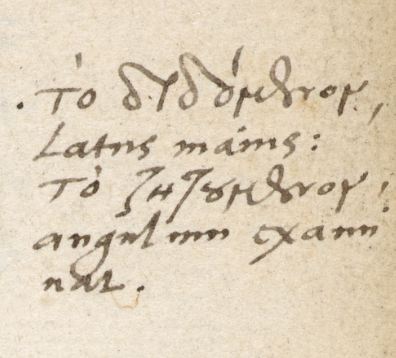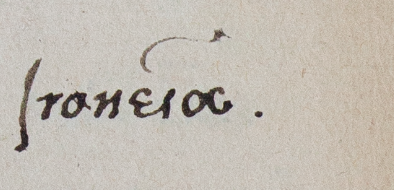Down to the Detail of Dee’s Greek Marginalia
Happy New Year from the AOR team! In order to start 2019 and the last month of AOR with a bang, here’s the blog written by our research assistant and newly-minted doctor Juan Avecedo!
I have spent some weeks transcribing Dee’s Greek marginalia in the AOR corpus, which includes mostly topical notes, a few citations from related Greek works, and occasionally also a reference to a significant Greek associated concept. So, apart from the citations, which are rare and can be a few lines long, his Greek notes are very succinct and to the point. It is known that in other works, as in his diaries for instance, Dee used Greek for reserve’s sake, like for private notes, so much so that he referred to himself with the Greek acronym Δ. But in the AOR corpus, his Greek notes are mostly limited to technical terms in rhetoric, astronomy, geometry, astrology and other fields. This is why what I have found more interesting in this short acquaintance is the privileged glimpse into the intimate relation between a scholar like Dee and the Greek language.

Rabelais famously spoke of Greek being transmitted from hand to hand over the centuries like a secret knowledge, and with Dee one is struck by how the use of Greek is effectively a persistent evocation or rather, properly, an invocation of the original sources of knowledge, and thus a permanent reminder. I would suggest that in his marginalia the use of Greek is a reminder in two complementary ways: a very practical one, namely the recalling of technical terms and expressions; and another way, more philosophical and more direct, whereby we are reminded of that ‘hand to hand’ continuity, of the ever present, ever available treasury of Greek literature and knowledge.

Another interesting question that leaps from the annotated pages is the extent of Dee’s proficiency in Greek. It is known that upon the foundation of Trinity College, Cambridge, in 1546, he was appointed under-reader of Greek, so he must have obviously been adept at teaching Greek. He possessed a number of Greek books which he marked and annotated copiously, so it is obvious that he was used to reading it too. What his Greek annotations reveal is, I believe, the insouciance of the true expert. His annotations are for the most part fully accented, which is no mean accomplishment in Classical Greek, but sometimes they are only partly or wrongly accented, or even mixing Latin and Greek letters. What this tells us, especially when contrasted with lengthier passages copied verbatim without any mistake, is that the majority of his Greek notes were made impromptu, without a model, and this would not be the case if the writing of Greek had not been a familiar activity to him. It is hard to tell how he would have compared with his contemporaries in this regard, but against our current standards, and upon the scrutiny involved in these transcriptions, I feel one can confidently say that Dee was an accomplished Hellenist in every way.

